Top 10: Facts about the new F40 BMW 1 Series
BMW has unveiled its third-generation 1 Series. Here are ten things to know about this all-new hatchback, which is destined to become a very common sight on British roads.
1. It’s built on a front-wheel drive platform
Unlike the previous E87 and F20 models, the F40 isn’t rear-wheel drive. Purists will bemoan such a radical change and, unfortunately, BMW has abandoned the one trait that used to really differentiate the 1 Series.
However, most target customers simply won’t care, so sales are unlikely to be adversely affected.
2. Technology is employed to deliver decent handling
A BMW still has to be engaging to drive. Therefore, to help overcome some of the inherent deficiencies of front-wheel drive (i.e. loss of traction under hard acceleration, torque steer and understeer), ‘actuator contiguous wheel slip limitation’ – known as ARB – is fitted as standard.
The BMW Performance Control system also limits understeer through a ‘yaw movement distribution’ function. In essence, this applies a braking force to the inside wheels when cornering.
Furthermore, by specifying adaptive suspension with Variable Damper Control as a cost option, either Comfort or Sport settings can be selected.
3. Some versions have all-wheel drive
Given their prodigious torque levels (see below), the 120d and M135i are sensibly equipped with xDrive intelligent all-wheel drive. When necessary, this usually front-biased set-up distributes engine output evenly between the two axles.
4. The dimensions are roughly unchanged
BMW has thankfully avoided the ‘size creep’ trend seen too often nowadays. In fact, at 4,319 mm (14’ 2”) long, the F40 is actually 5 mm (0.2”) shorter than the superseded 1 Series. Width and height are up by 34 mm (1.3”) and 13 mm (0.5”) respectively, though.
5. Packaging is improved
Switching to a front-wheel drive, transverse engine architecture does bring some significant benefits. For instance, there’s more cabin space because the bonnet is shorter and an intrusive transmission tunnel isn’t required.
In particular, rear-seat passengers now get extra knee room, head room and elbow room, plus boot capacity has risen by 20 litres to 380 litres.
6. Weight has been lost
While the main body structure is made from high-strength steel, aluminium is used for certain components including the bonnet and tailgate. Consequently, torsional rigidity is better and the F40 1 Series is lighter by up to 30 kg (66 lbs).
7. Two turbocharged petrol engines are being offered
With its eight-speed Steptronic Sport automatic transmission, Torsen mechanical limited-slip differential and Launch Control mode, the M135i xDrive can accelerate from rest to 62 mph (100 km/h) in 4.8 seconds before going on to a top speed of 155 mph (250 km/h).
8. Three turbocharged diesel engines are being offered
9. Customers can choose from three trim grades
No real surprises here. For the UK market, SE, Sport and M Sport variants are going to be available.
10. Prices start from £24,430
Deliveries of the new 1 Series hatchback will begin in September. The on-the-road starting prices are:
BMW 2 Series Gran Coupé launch confirmed
BMW X2 M35i unveiled
1. It’s built on a front-wheel drive platform
Unlike the previous E87 and F20 models, the F40 isn’t rear-wheel drive. Purists will bemoan such a radical change and, unfortunately, BMW has abandoned the one trait that used to really differentiate the 1 Series.
However, most target customers simply won’t care, so sales are unlikely to be adversely affected.
2. Technology is employed to deliver decent handling
A BMW still has to be engaging to drive. Therefore, to help overcome some of the inherent deficiencies of front-wheel drive (i.e. loss of traction under hard acceleration, torque steer and understeer), ‘actuator contiguous wheel slip limitation’ – known as ARB – is fitted as standard.
The BMW Performance Control system also limits understeer through a ‘yaw movement distribution’ function. In essence, this applies a braking force to the inside wheels when cornering.
Furthermore, by specifying adaptive suspension with Variable Damper Control as a cost option, either Comfort or Sport settings can be selected.
3. Some versions have all-wheel drive
Given their prodigious torque levels (see below), the 120d and M135i are sensibly equipped with xDrive intelligent all-wheel drive. When necessary, this usually front-biased set-up distributes engine output evenly between the two axles.
4. The dimensions are roughly unchanged
BMW has thankfully avoided the ‘size creep’ trend seen too often nowadays. In fact, at 4,319 mm (14’ 2”) long, the F40 is actually 5 mm (0.2”) shorter than the superseded 1 Series. Width and height are up by 34 mm (1.3”) and 13 mm (0.5”) respectively, though.
5. Packaging is improved
Switching to a front-wheel drive, transverse engine architecture does bring some significant benefits. For instance, there’s more cabin space because the bonnet is shorter and an intrusive transmission tunnel isn’t required.
In particular, rear-seat passengers now get extra knee room, head room and elbow room, plus boot capacity has risen by 20 litres to 380 litres.
6. Weight has been lost
While the main body structure is made from high-strength steel, aluminium is used for certain components including the bonnet and tailgate. Consequently, torsional rigidity is better and the F40 1 Series is lighter by up to 30 kg (66 lbs).
7. Two turbocharged petrol engines are being offered
- 118i – 1.5 litre, three cylinders, 138 bhp (103 kW / 140 PS) and 220 Nm (162 lb/ft)
- M135i xDrive – 2.0 litre, four cylinders, 302 bhp (225 kW / 306 PS) and 450 Nm (332 lb/ft)
With its eight-speed Steptronic Sport automatic transmission, Torsen mechanical limited-slip differential and Launch Control mode, the M135i xDrive can accelerate from rest to 62 mph (100 km/h) in 4.8 seconds before going on to a top speed of 155 mph (250 km/h).
8. Three turbocharged diesel engines are being offered
- 116d – 1.5 litre, three cylinders, 114 bhp (85 kW / 116 PS) and 270 Nm (199 lb/ft)
- 118d – 2.0 litre, four cylinders, 148 bhp (110 kW / 150 PS) and 350 Nm (258 lb/ft)
- 120d xDrive – 2.0 litre, four cylinders, 187 bhp (140 kW / 190 PS) and 400 Nm (295 lb/ft)
9. Customers can choose from three trim grades
No real surprises here. For the UK market, SE, Sport and M Sport variants are going to be available.
10. Prices start from £24,430
Deliveries of the new 1 Series hatchback will begin in September. The on-the-road starting prices are:
- 118i – £24,430
- 116d – £25,480
- 118d – £26,640
- 120d xDrive – £32,470
- M135i xDrive – £36,430
BMW 2 Series Gran Coupé launch confirmed
BMW X2 M35i unveiled


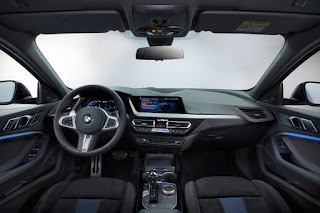
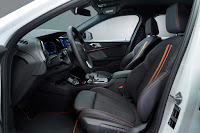
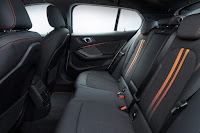
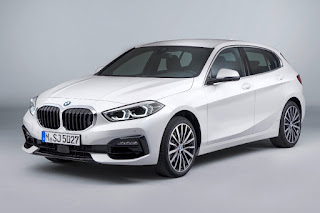

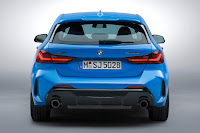
+Front+Side.jpg)


%2BFront%2BSide.jpg)


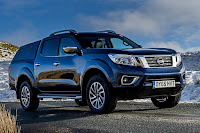
Comments
Post a Comment